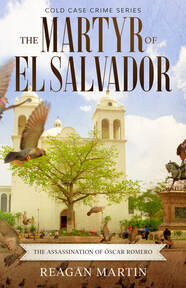The Martyr of El Salvador: The Assassination of Óscar Romero

Who would murder one of the most respected priests of South America?
Óscar Romero, a respected Catholic priest, called on soldiers, as Christians, to put down their arms and stop carrying out the governments order to strip citizens of the most basic human rights...for this he was assassinated.
For over 30 years, his murder has gone unsolved.
Who would murder a priest who only wanted to stop the injustice? And more importantly, why is it that, with substantial evidence naming the murderers involved, was nothing done to convict those guilty of murdering the country's beloved archbishop?
Óscar Romero, a respected Catholic priest, called on soldiers, as Christians, to put down their arms and stop carrying out the governments order to strip citizens of the most basic human rights...for this he was assassinated.
For over 30 years, his murder has gone unsolved.
Who would murder a priest who only wanted to stop the injustice? And more importantly, why is it that, with substantial evidence naming the murderers involved, was nothing done to convict those guilty of murdering the country's beloved archbishop?
Buy Now!
Excerpt
PROLOGUE
March 12, 1977 was a Saturday, and Father Rutilio Grande was running late. He was scheduled to say the evening mass at El Paisnal, a small rural community near San Salvador, and Manuel Solórzano and Nelson Lemus, two men who had come to drive him to the church, were already waiting for him.
Manuel was 72-years-old, kind, gentle, and exceedingly loyal to Father Grande. Nelson, on the other hand, was still a boy at 15, but the environment he had been born and raised in had stolen his youth and forced him to become a man far too soon. Not his home environment, for his family was extremely close and god-fearing, but the environment his government had created for its subjects.
The country of El Salvador was ruled by a brutal and sadistic regime that cared nothing about the exceedingly poor people who lived there, or the hardships they endured on a daily basis. They viewed the peasants, those like Manuel and Nelson, and all the other people Father Grande ministered to, as ‘sub-humans’ with little value, and even less worth.
As Father Grande adjusted the white Roman collar on his clerical suit, he thought about the climate of fear that was escalating in his country, and he was deeply concerned by it. There was a time when priests were looked upon as holy and respectable men in El Salvador, but not any longer. At least not to the hierarchy of the country.
Faith and preaching were actions that were contrary to the government’s beliefs, and the Bible was not viewed as the word of God, but as a subversive book designed to overthrow their rule. Priests all over the country were coming under attack by ruthless military soldiers. They were being harassed and abused, and often deported for little more than preaching the gospel.
Only a month earlier, a Columbian priest had been exiled from the country for holding mass, an act that inspired Father Grande to give a sermon that drew sharp criticism from the Salvadoran government.
Telling his congregation that he feared the Holy Bible would soon be banned from their country, Father Grande continued his sermon in a sarcastic manner;
“The Bible is subversive – after all, all of its pages are against sin. If Jesus of Nazareth returned today, I dare say he would not arrive with preaching and actions. They, [the Salvadoran government], would arrest him for being a subversive and crucify him again!”
The sermon had rallied the peasant congregation, but Father Grande knew it had infuriated the regime and its military. He was concerned, not for his own safety, for he had no fear of death, but for the peasants he ministered too, and what would become of them if something were to happen to him.
He would like to think the church would continue his work, but he was not convinced that they would. Only a month earlier, in February, Archbishop Luis Chavez, a humanitarian who shared Father Grande’s concern for the peasant population, had reached the mandatory age of retirement, and was replaced by Archbishop Oscar Romero. Although Rutilio Grande and Oscar Romero were close friends, Grande was disappointed by the replacement.
Oscar Romero was known to be a staunch conservative who kept the church and political climate totally separate, a fact, Father Grande was certain, which had a lot to do with his appointment as Archbishop. The church, as well as the government and military of El Salvador wanted someone like Romero to head the church. Someone who would preach non-violence and quell the rising anger in the unhappy peasants. With Romero now in control, Father Grande feared that any progress made with the downtrodden of the country would be completely reversed.
But Father Grande couldn’t think about that right now. He was already late and Manuel Solórzano was calling to him for the second time.
“I’m coming.” The priest called back to his waiting helpers. Hastily grabbing his hat, Father Grande went outside and climbed into the passenger seat of the waiting car.
Manuel was driving, and Nelson sat in the backseat as the vehicle pulled away and began traveling down the dirt road. Their destination was rural, and they drove between fields brimming with sugar cane. Father Grande’s mind was wandering once again, and he made a mental note to contact his old friend, the new Archbishop Romero, to discuss the work with the peasants he felt needed to continue.
But Father Grande would never get the chance. Out of nowhere, a spray of machine gun fire erupted, rat-a-tat-tatting at a nonstop pace, pelting the car with bullets that ripped through the metal like tissue paper, and piercing its targets inside. No one in the car had time to react. All three were hit almost simultaneously, and the car, no longer under control, veered off the road and plowed through a hedge of sugar cane.
Manuel Solórzano, Nelson Lemus, and Father Rutilio Grande were dead, and although he didn’t know it at the time, the murders were a warning to Father Grande’s good friend, the new Archbishop, Oscar Romero.
March 12, 1977 was a Saturday, and Father Rutilio Grande was running late. He was scheduled to say the evening mass at El Paisnal, a small rural community near San Salvador, and Manuel Solórzano and Nelson Lemus, two men who had come to drive him to the church, were already waiting for him.
Manuel was 72-years-old, kind, gentle, and exceedingly loyal to Father Grande. Nelson, on the other hand, was still a boy at 15, but the environment he had been born and raised in had stolen his youth and forced him to become a man far too soon. Not his home environment, for his family was extremely close and god-fearing, but the environment his government had created for its subjects.
The country of El Salvador was ruled by a brutal and sadistic regime that cared nothing about the exceedingly poor people who lived there, or the hardships they endured on a daily basis. They viewed the peasants, those like Manuel and Nelson, and all the other people Father Grande ministered to, as ‘sub-humans’ with little value, and even less worth.
As Father Grande adjusted the white Roman collar on his clerical suit, he thought about the climate of fear that was escalating in his country, and he was deeply concerned by it. There was a time when priests were looked upon as holy and respectable men in El Salvador, but not any longer. At least not to the hierarchy of the country.
Faith and preaching were actions that were contrary to the government’s beliefs, and the Bible was not viewed as the word of God, but as a subversive book designed to overthrow their rule. Priests all over the country were coming under attack by ruthless military soldiers. They were being harassed and abused, and often deported for little more than preaching the gospel.
Only a month earlier, a Columbian priest had been exiled from the country for holding mass, an act that inspired Father Grande to give a sermon that drew sharp criticism from the Salvadoran government.
Telling his congregation that he feared the Holy Bible would soon be banned from their country, Father Grande continued his sermon in a sarcastic manner;
“The Bible is subversive – after all, all of its pages are against sin. If Jesus of Nazareth returned today, I dare say he would not arrive with preaching and actions. They, [the Salvadoran government], would arrest him for being a subversive and crucify him again!”
The sermon had rallied the peasant congregation, but Father Grande knew it had infuriated the regime and its military. He was concerned, not for his own safety, for he had no fear of death, but for the peasants he ministered too, and what would become of them if something were to happen to him.
He would like to think the church would continue his work, but he was not convinced that they would. Only a month earlier, in February, Archbishop Luis Chavez, a humanitarian who shared Father Grande’s concern for the peasant population, had reached the mandatory age of retirement, and was replaced by Archbishop Oscar Romero. Although Rutilio Grande and Oscar Romero were close friends, Grande was disappointed by the replacement.
Oscar Romero was known to be a staunch conservative who kept the church and political climate totally separate, a fact, Father Grande was certain, which had a lot to do with his appointment as Archbishop. The church, as well as the government and military of El Salvador wanted someone like Romero to head the church. Someone who would preach non-violence and quell the rising anger in the unhappy peasants. With Romero now in control, Father Grande feared that any progress made with the downtrodden of the country would be completely reversed.
But Father Grande couldn’t think about that right now. He was already late and Manuel Solórzano was calling to him for the second time.
“I’m coming.” The priest called back to his waiting helpers. Hastily grabbing his hat, Father Grande went outside and climbed into the passenger seat of the waiting car.
Manuel was driving, and Nelson sat in the backseat as the vehicle pulled away and began traveling down the dirt road. Their destination was rural, and they drove between fields brimming with sugar cane. Father Grande’s mind was wandering once again, and he made a mental note to contact his old friend, the new Archbishop Romero, to discuss the work with the peasants he felt needed to continue.
But Father Grande would never get the chance. Out of nowhere, a spray of machine gun fire erupted, rat-a-tat-tatting at a nonstop pace, pelting the car with bullets that ripped through the metal like tissue paper, and piercing its targets inside. No one in the car had time to react. All three were hit almost simultaneously, and the car, no longer under control, veered off the road and plowed through a hedge of sugar cane.
Manuel Solórzano, Nelson Lemus, and Father Rutilio Grande were dead, and although he didn’t know it at the time, the murders were a warning to Father Grande’s good friend, the new Archbishop, Oscar Romero.






